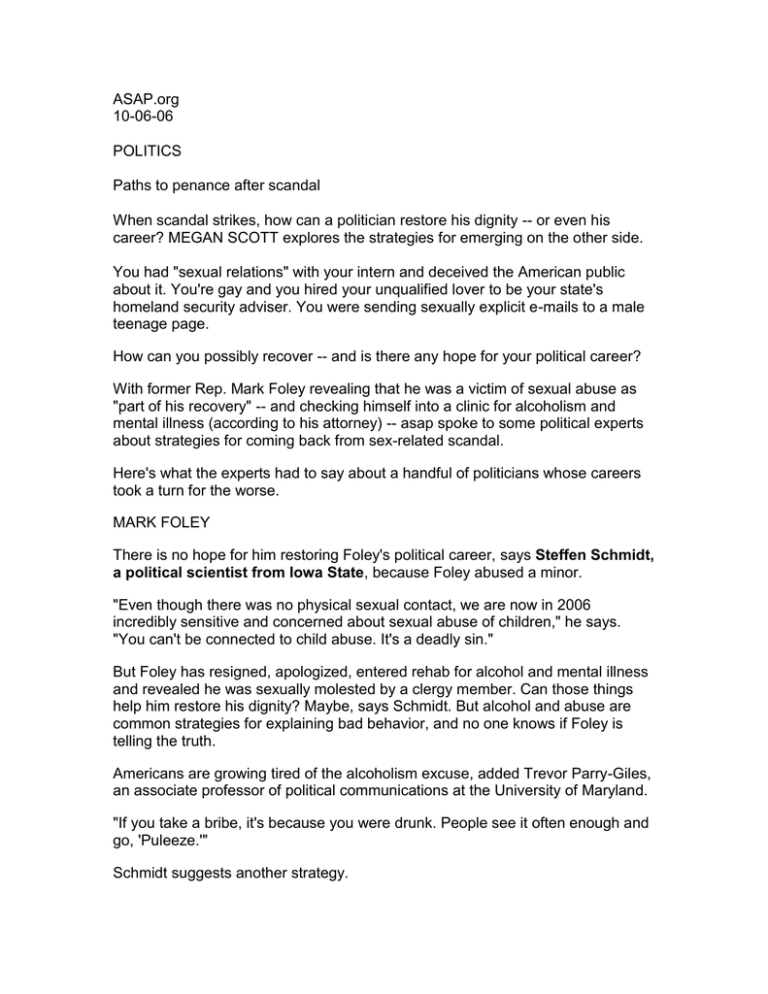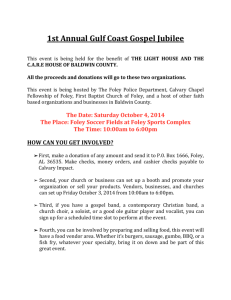
ASAP.org
10-06-06
POLITICS
Paths to penance after scandal
When scandal strikes, how can a politician restore his dignity -- or even his
career? MEGAN SCOTT explores the strategies for emerging on the other side.
You had "sexual relations" with your intern and deceived the American public
about it. You're gay and you hired your unqualified lover to be your state's
homeland security adviser. You were sending sexually explicit e-mails to a male
teenage page.
How can you possibly recover -- and is there any hope for your political career?
With former Rep. Mark Foley revealing that he was a victim of sexual abuse as
"part of his recovery" -- and checking himself into a clinic for alcoholism and
mental illness (according to his attorney) -- asap spoke to some political experts
about strategies for coming back from sex-related scandal.
Here's what the experts had to say about a handful of politicians whose careers
took a turn for the worse.
MARK FOLEY
There is no hope for him restoring Foley's political career, says Steffen Schmidt,
a political scientist from Iowa State, because Foley abused a minor.
"Even though there was no physical sexual contact, we are now in 2006
incredibly sensitive and concerned about sexual abuse of children," he says.
"You can't be connected to child abuse. It's a deadly sin."
But Foley has resigned, apologized, entered rehab for alcohol and mental illness
and revealed he was sexually molested by a clergy member. Can those things
help him restore his dignity? Maybe, says Schmidt. But alcohol and abuse are
common strategies for explaining bad behavior, and no one knows if Foley is
telling the truth.
Americans are growing tired of the alcoholism excuse, added Trevor Parry-Giles,
an associate professor of political communications at the University of Maryland.
"If you take a bribe, it's because you were drunk. People see it often enough and
go, 'Puleeze.'"
Schmidt suggests another strategy.
"Tell the people you have found religion," he says. "Combined with alcoholism
and abuse, that's a complete house of defensive cards."
BILL CLINTON
He was running around on his wife even before he got the Democratic
nomination. He had an affair with one-time intern Monica Lewinsky, and lied
about it. Sure he said the affair was a "terrible mistake," but he never blamed
alcohol or childhood abuse (though others talked about it), and he didn't find
religion.
"Bill Clinton has the magic touch," Schmidt says. "There is something about his
personality and the way he behaves. His wife forgave him, so that helped take
the edge off of it."
Also, he says, Clinton was not dealing with minors. Monica was not 15. Had
Monica been underage, he would have retreated from the spotlight.
Clinton was also seen as doing a good job as president, Parry-Giles says.
"The economy was booming and we weren't at war," he says. "People treat
transgressors more harshly when they aren't doing a good job."
BARNEY FRANK
Frank was having a relationship with a male hooker who ran a bisexual
prostitution service out of the congressman's home. Frank, who said he was
unaware of the activity, was reprimanded by the House in 1990. He refused to
resign from Congress and has gone on to win re-election numerous times.
How did he survive?
For one thing, he was punished, Schmidt says, and that eases some of the
electoral anger.
And some of it was timing.
Political scandals were not as out in the open as they are now, says Julian
Zelizer, a professor of congressional history at Boston University and author of
"On Capitol Hill: The Struggle to Reform Congress and its Consequence." No
one was pushing public morality either, he says.
"It wasn't the same atmosphere," he says. "Scandals fizzled."
Frank also comes from a liberal district.
"His constituents in Massachusetts were just much more forgiving," says Dennis
Johnson, who teaches political management at George Washington University.
"People back in his district thought there were more important things to be
concerned about."
GERRY STUDDS
The House censured the Massachusetts Democrat in 1983 for propositioning
three male teenage pages and having sex with one of them. The congressman
never resigned and never apologized for the relationship -- he insisted he had not
done anything wrong.
After being censured by the House, Studds was elected for several more years.
His secret? The propositions happened back in the 1970s.
"People had a chance to say, 'Well he's been serving us well all those years in
between,'" says Brian Gaines, a professor in the political science department and
at the Institute of Government and Public Affairs at the University of Illinois.
The page, who was 17 years old, also appeared with Studds at a press
conference to say that what happened between them was consensual and no
one else's business.
DAN CRANE
The married father of six had a sexual relationship with an underage female page
in 1980. Congress censured the Republican congressman in 1983.
Unlike Studds, Crane issued a tearful apology. But the tears didn't soften his
constituents -- he lost his bid for re-election in 1984.
Where did he go wrong?
His constituents held him to a higher standard than Studds, says Zelizer, and
Crane had positioned himself as a hardline conservative.
"It's very hard if you are a politician and staked your reputation on a certain
amount of politics to survive in office," he says.
What could Crane have done? Turn voter attention to some of his more positive
attributes, suggests Zelizer. Or use the alcohol or child abuse claim. Maybe it
would have worked better back then.
Megan Scott is an asap reporter based in New York. POLITICS






